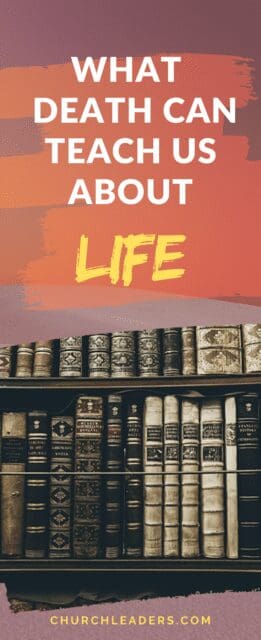When sportscaster Glenn Brenner died at the age of 44 in Washington DC, the city was in shock for several days. Why? After all, the city had been dubbed the murder capital of the United States, and victims of violent crime die there virtually every day—sometimes a half-dozen a night. Yet radio talk-show hosts displayed a remembrance of death by devoting entire mornings or afternoons to Brenner’s death. The newspaper covered it in every issue for a week. One television station ran a half-hour memorial program.
The city was stunned by the suddenness of the death. It forced people to remember that death doesn’t always wait until we’re 95. Sometimes it sneaks up on us in our forties. As people called talk shows to express their shock, they repeated a familiar refrain: “It was so sudden; so unexpected. He was so young, in such good health, and then all of a sudden…I just can’t believe it.”
Brenner had recently completed a marathon. He was young, healthy, humorous, and successful, but all of that became irrelevant when a brain tumor took his life. Death didn’t take into account his cardiovascular capability. It didn’t inquire about the number of children still depending on him or his vocational success or how beloved he was in the capital city. Death doesn’t ask questions; it doesn’t review résumés. It just comes.
The city was unsettled by death’s rude intrusion into its life. Denial was no longer possible, and people were forced to consider that maybe there’s more to life than we have been told. Maybe we need to make some inquiries and answer a few questions before death comes to knock on our door.
Every now and then we sneak a peek at the obituaries and look at the ages of those who have died. When we see somebody our own age or even younger, we involuntarily wince. We grope for the cause of death—please don’t let it be a heart attack or cancer, we hope. We want to be immune from that, at least for now.
Our denial means nothing to death because death doesn’t have to ask our permission. Death is coming. Every day is somebody’s last.
The Denial of Death
In spite of the prevalence of death, we prefer not to talk about it. In this we’re similar to previous generations. Fénelon wrote of this denial centuries ago:
We consider ourselves immortal, or at least as though going to live for centuries. Folly of the human spirit! Every day those who die soon follow those who are already dead. One about to leave on a journey ought not to think himself far from one who went only two days before. Life flows by like a flood. 1
Most of us recognize that we will eventually die—but decades from now, not today, not this week, not this month, not this year. Death is a foreigner, not a close neighbor.
We live our lives while clutching fiercely to this illusion. How else can we explain the fact that so many die without a will? We live without making a will, not because we believe we’ll never die, but because we don’t expect to die this week. Thus we have more important tasks to take care of, meetings to attend, things to buy, walls to paint.
Why do we deny death? Fénelon believed we avoid the thought of death so we are not saddened by it. But this, he said, is shortsighted. “It will only be sad for those who have not thought about it.” 2
William Law wrote that the living world’s brilliance blinds us from eternity and the reality of death. “The health of our bodies, the passions of our minds, the noise and hurry and pleasures and business of the world, lead us on with eyes that see not and ears that hear not.” 3
Part of this denial comes from the company we keep. During the seven years I studied in college and seminary, I attended a church with a congregation that was predominantly young. During those seven years, one person in the congregation died, and it was big news.
My first position after seminary was in a more historic church with a predominantly older congregation. The first church had required two rooms to break up the nursery, but this church couldn’t round up enough babies to fill more than two or three double strollers. During our first six months, we had three funerals.


